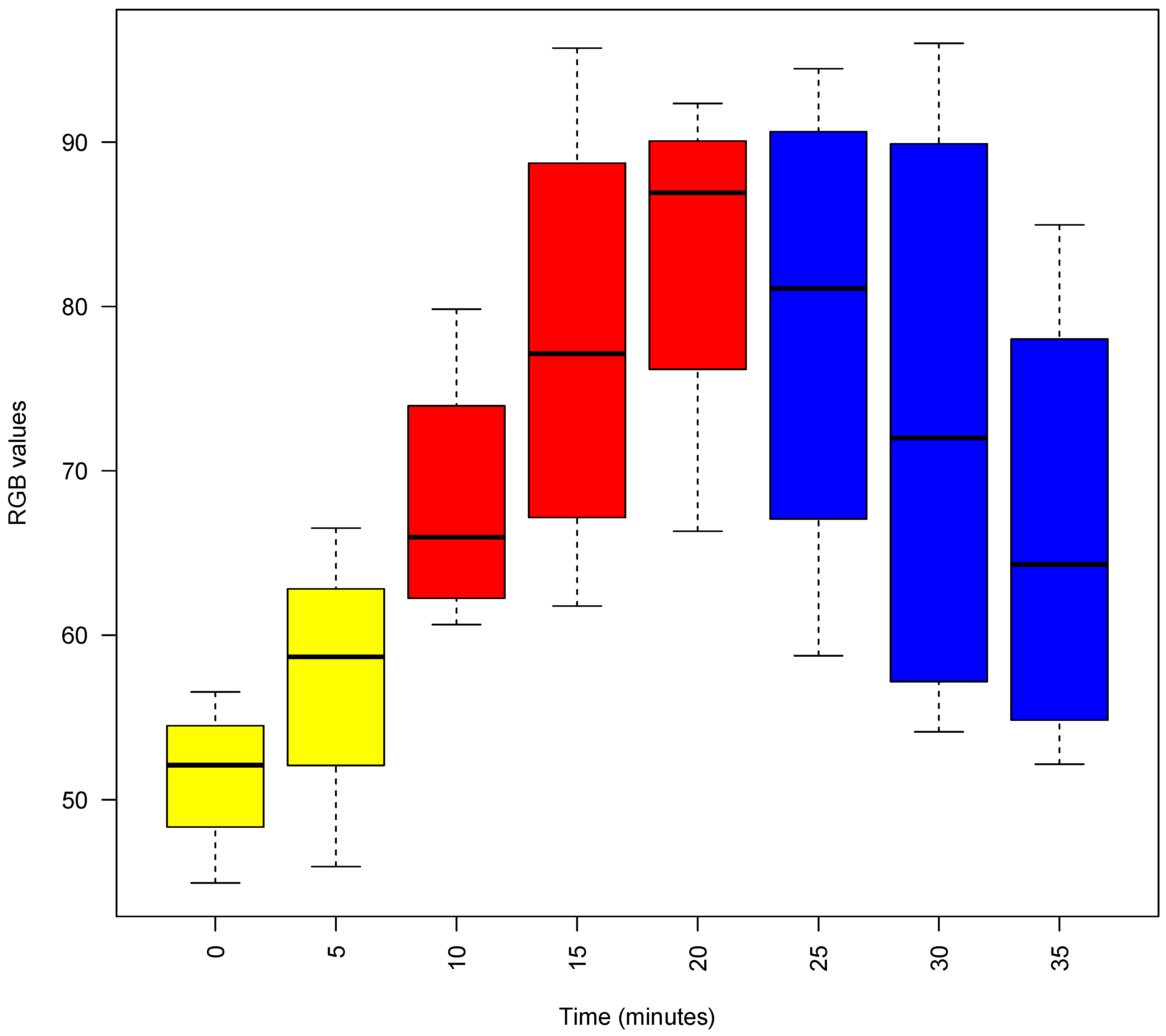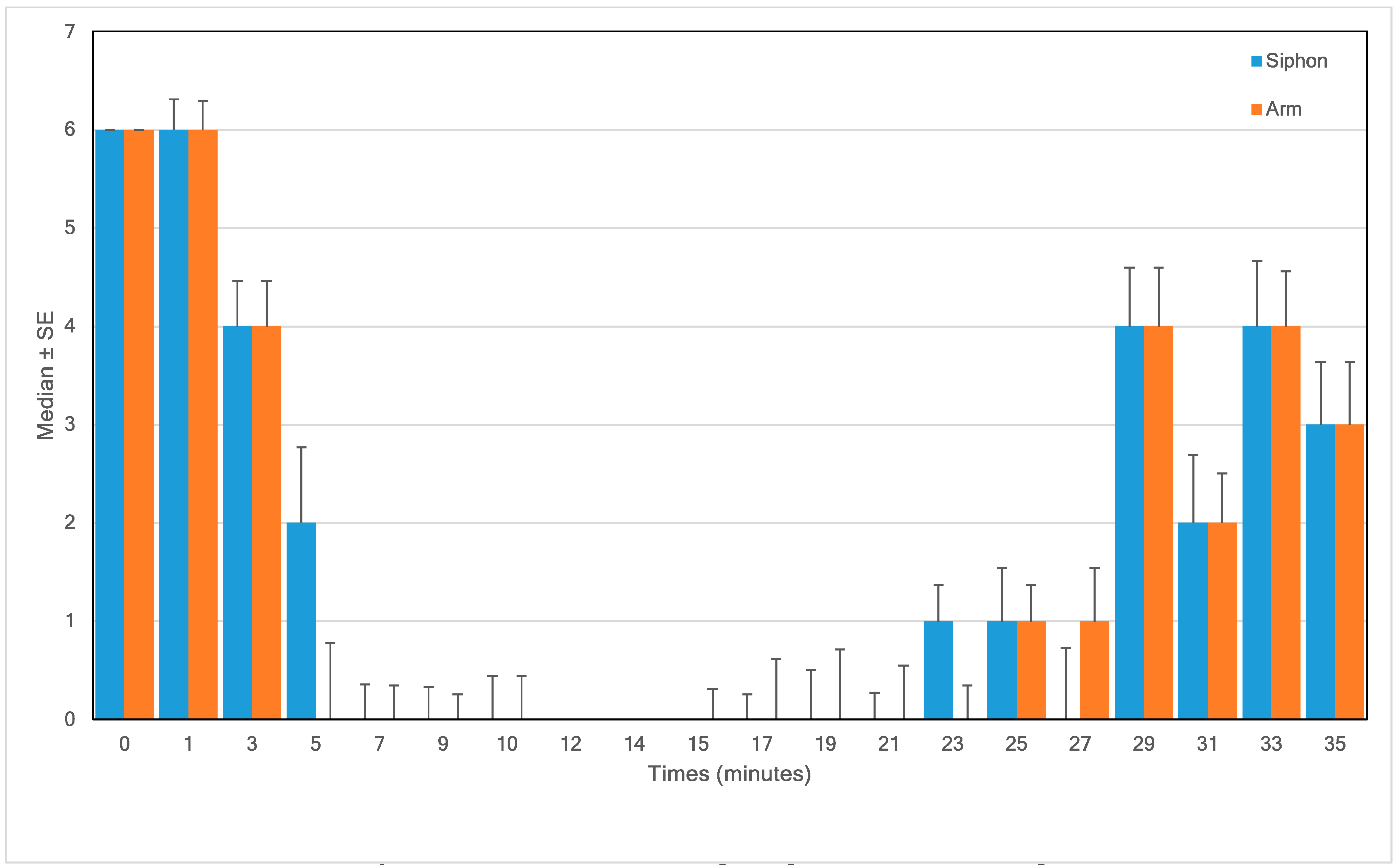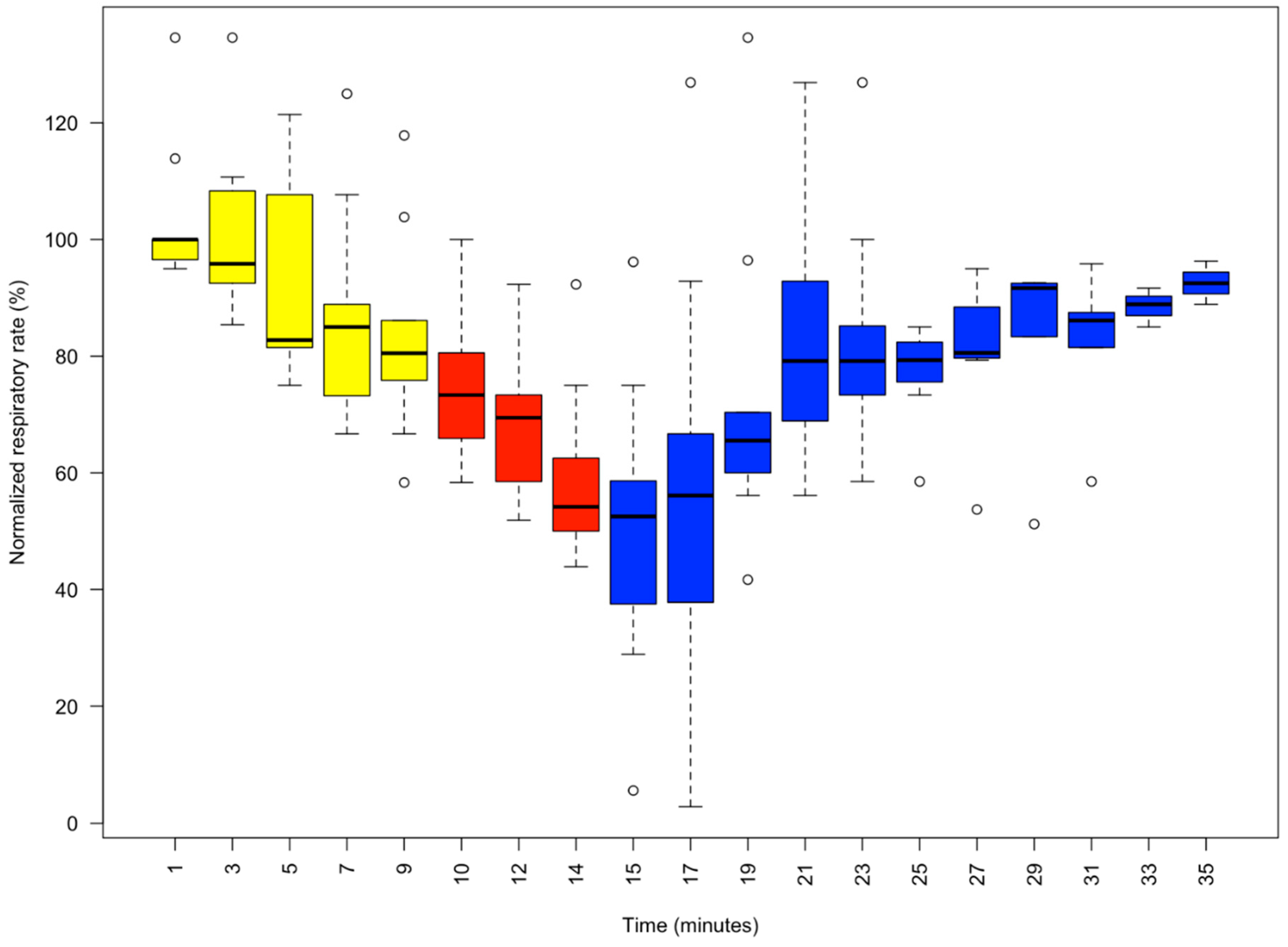Submitted:
16 October 2023
Posted:
19 October 2023
You are already at the latest version
Abstract
Keywords:
Introduction
Materials and Methods
Animals
Results
Actions of 1% MgCl2 on animal behaviour



Addition of I% Isoflurane
Recovery from Anaesthesia
Discussion
References
- Mather, J.A. Animal suffering: An invertebrate perspective. Journal of Applied Animal Welfare Science 2001, 4, 151–156. [Google Scholar] [CrossRef]
- Paolucci, M.; Coccia, E.; Polese, G.; Di Cosmo, A. Current Issues on Freshwater Crayfish Aquaculture with a Focus on Crustacean Welfare. In: Current Issues on Freshwater Crayfish Aquaculture. 2023, Chap.16, 241-273.
- Passantino, A.; Elwood, R.W.; Coluccio, P. Why Protect Decapod Crustaceans Used as Models in Biomedical Research and in Ecotoxicology? Ethical and Legislative Considerations. Animals (Basel) 2021, 11. [Google Scholar] [CrossRef]
- Fiorito, G.; Affuso, A.; Anderson, D.B.; Basil, J.; Bonnaud, L.; Botta, G.; Cole, A.; D’Angelo, L.; De Girolamo, P.; Dennison, N.; et al. Cephalopods in neuroscience: regulations, research and the 3Rs. Invert Neurosci 2014, 14, 13–36. [Google Scholar] [CrossRef]
- Winlow, W.; Polese, G.; Moghadam, H.F.; Ahmed, I.A.; Di Cosmo, A. Sense and Insensibility - An Appraisal of the Effects of Clinical Anesthetics on Gastropod and Cephalopod Molluscs as a Step to Improved Welfare of Cephalopods. Front Physiol 2018, 9, 1147. [Google Scholar] [CrossRef]
- Crook, R.J.; Walters, E.T. Nociceptive Behavior and Physiology of Molluscs: Animal Welfare Implications. Ilar Journal. 2011, 52, 185–195. [Google Scholar] [CrossRef]
- Lewbart, G.A.; Mosley, C. Clinical Anesthesia and Analgesia in Invertebrates. Journal of Exotic Pet Medicine 2012, 21, 59–70. [Google Scholar] [CrossRef]
- Elwood, R.W. Pain and suffering in invertebrates? Ilar j 2011, 52, 175–184. [Google Scholar] [CrossRef] [PubMed]
- Crook, R.J.; Hanlon, R.T.; Walters, E.T. Squid have nociceptors that display widespread long-term sensitization and spontaneous activity after bodily injury. J Neurosci 2013, 33, 10021–10026. [Google Scholar] [CrossRef] [PubMed]
- Sneddon, L.U. Pain in aquatic animals. J Exp Biol 2015, 218, 967–976. [Google Scholar] [CrossRef] [PubMed]
- Crook, R.J. Behavioral and neurophysiological evidence suggests affective pain experience in octopus. iScience 2021, 24, 102229. [Google Scholar] [CrossRef] [PubMed]
- Elwood, R.W. Behavioural Indicators of Pain and Suffering in Arthropods and Might Pain Bite Back? Animals 2023, 13, 2602. [Google Scholar] [CrossRef] [PubMed]
- García-Franco, M. Anaesthetics for the squid Sepioteuthis sepioidea (mollusca: cephalopoda). Comparative Biochemistry and Physiology Part C: Comparative Pharmacology 1992, 103, 121–123. [Google Scholar] [CrossRef]
- Pugliese, C.; Mazza, R.; Andrews, P.L.; Cerra, M.C.; Fiorito, G.; Gattuso, A. Effect of Different Formulations of Magnesium Chloride Used As Anesthetic Agents on the Performance of the Isolated Heart of Octopus vulgaris. Front Physiol 2016, 7, 610. [Google Scholar] [CrossRef]
- Butler-Struben, H.M.; Brophy, S.M.; Johnson, N.A.; Crook, R.J. In Vivo Recording of Neural and Behavioral Correlates of Anesthesia Induction, Reversal, and Euthanasia in Cephalopod Molluscs. Front Physiol 2018, 9, 109. [Google Scholar] [CrossRef]
- Abbo, L.A.; Himebaugh, N.E.; DeMelo, L.M.; Hanlon, R.T.; Crook, R.J. Anesthetic Efficacy of Magnesium Chloride and Ethyl Alcohol in Temperate Octopus and Cuttlefish Species. J Am Assoc Lab Anim Sci 2021, 60, 556–567. [Google Scholar] [CrossRef]
- James, M.F.M. Clinical Use of Magnesium Infusions in Anesthesia. Anesthesia & Analgesia 1992, 74. [Google Scholar]
- De Oliveira, G.S., Jr.; Castro-Alves, L.J.; Khan, J.H.; McCarthy, R.J. Perioperative systemic magnesium to minimize postoperative pain: a meta-analysis of randomized controlled trials. Anesthesiology 2013, 119, 178–190. [Google Scholar] [CrossRef]
- Polese, G.; Winlow, W.; Di Cosmo, A. Dose-dependent effects of the clinical anesthetic isoflurane on Octopus vulgaris: a contribution to cephalopod welfare. Journal of aquatic animal health 2014, 26, 285–294. [Google Scholar] [CrossRef] [PubMed]
- Messenger, J.B. Cephalopod chromatophores: neurobiology and natural history. Biol Rev Camb Philos Soc 2001, 76, 473–528. [Google Scholar] [CrossRef] [PubMed]
- Di Cosmo, A.; Polese, G.; Bertapelle, C.; Palumbo, A. ; L., Z. Cefalopodi. Benessere ed animal care dell’animale da laboratorio.; Le Point Veterinaire Italie: Milano, 2015. [Google Scholar]
- Maselli, V.; Polese, G.; Al-Soudy, A.S.; Buglione, M.; Di Cosmo, A. Cognitive Stimulation Induces Differential Gene Expression in Octopus vulgaris: The Key Role of Protocadherins. Biology (Basel) 2020, 9, 196. [Google Scholar] [CrossRef] [PubMed]
- Maselli, V.; Al-Soudy, A.S.; Buglione, M.; Aria, M.; Polese, G.; Di Cosmo, A. Sensorial Hierarchy in Octopus vulgaris’s Food Choice: Chemical vs. Visual. Animals (Basel) 2020, 10. [Google Scholar] [CrossRef]
- Collins, T.J. ImageJ for microscopy. Biotechniques 2007, 43, 25–30. [Google Scholar] [CrossRef]
- Pauca, A.L.; Dripps, R.D. Clinical experience with isoflurane (Forane): preliminary communication. BJA: British Journal of Anaesthesia 1973, 45, 697–703. [Google Scholar] [CrossRef]
- Guedel, A.E. Inhalation Anesthesia: A Fundamental Guide. Anesthesia & Analgesia 1937, 16. [Google Scholar]
- Gutnick, T.; Neef, A.; Cherninskyi, A.; Ziadi-Künzli, F.; Di Cosmo, A.; Lipp, H.-P.; Kuba, M.J. Recording electrical activity from the brain of behaving octopus. Current Biology 2023. [Google Scholar] [CrossRef]
- Fathi Moghadam, H.; Yar, T.; Qazzaz, M.M.; Ahmed, I.A.; Winlow, W. A Comparative Study of Cell Specific Effects of Systemic and Volatile Anesthetics on Identified Motor Neurons and Interneurons of Lymnaea stagnalis (L.), Both in the Isolated Brain and in Single Cell Culture. Front Physiol 2019, 10, 583. [Google Scholar] [CrossRef]
- Hao, X., Ou, M., Zhang, D., et al. The effects of general anaethetics on synaptic transmission. Current Neuropharmacology 2020, 18, 936–965. [CrossRef] [PubMed]
- Kelz, M.B., Mashour, G,A. The biology of general anesthesia from Paramecium to primate. Curr. Biol. 2019, 29, R1199–R1210. [CrossRef] [PubMed]
- Dickinson, R.; Lieb, W.R.; Franks, N.P. The effects of temperature on the interactions between volatile general anaesthetics and a neuronal nicotinic acetylcholine receptor. BRITISH JOURNAL OF PHARMACOLOGY 1995, 116, 2949–2956. [Google Scholar] [CrossRef] [PubMed]
Disclaimer/Publisher’s Note: The statements, opinions and data contained in all publications are solely those of the individual author(s) and contributor(s) and not of MDPI and/or the editor(s). MDPI and/or the editor(s) disclaim responsibility for any injury to people or property resulting from any ideas, methods, instructions or products referred to in the content. |
© 2023 by the authors. Licensee MDPI, Basel, Switzerland. This article is an open access article distributed under the terms and conditions of the Creative Commons Attribution (CC BY) license (http://creativecommons.org/licenses/by/4.0/).




